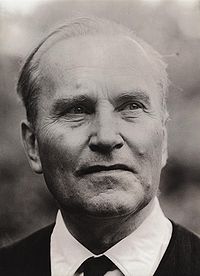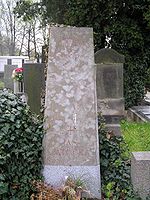
Jan Patocka
Encyclopedia

Czech Republic
The Czech Republic is a landlocked country in Central Europe. The country is bordered by Poland to the northeast, Slovakia to the east, Austria to the south, and Germany to the west and northwest....
philosophical phenomenology, as well as one of the most influential central European philosophers of the 20th century. Having studied in Prague
Prague
Prague is the capital and largest city of the Czech Republic. Situated in the north-west of the country on the Vltava river, the city is home to about 1.3 million people, while its metropolitan area is estimated to have a population of over 2.3 million...
, Paris
Paris
Paris is the capital and largest city in France, situated on the river Seine, in northern France, at the heart of the Île-de-France region...
, Berlin
Berlin
Berlin is the capital city of Germany and is one of the 16 states of Germany. With a population of 3.45 million people, Berlin is Germany's largest city. It is the second most populous city proper and the seventh most populous urban area in the European Union...
and Freiburg
Freiburg
Freiburg im Breisgau is a city in Baden-Württemberg, Germany. In the extreme south-west of the country, it straddles the Dreisam river, at the foot of the Schlossberg. Historically, the city has acted as the hub of the Breisgau region on the western edge of the Black Forest in the Upper Rhine Plain...
, he was one of the last pupils of Edmund Husserl
Edmund Husserl
Edmund Gustav Albrecht Husserl was a philosopher and mathematician and the founder of the 20th century philosophical school of phenomenology. He broke with the positivist orientation of the science and philosophy of his day, yet he elaborated critiques of historicism and of psychologism in logic...
, who is considered the founder of phenomenology, and Martin Heidegger
Martin Heidegger
Martin Heidegger was a German philosopher known for his existential and phenomenological explorations of the "question of Being."...
. During his studies in Freiburg he was also tutored by Eugen Fink
Eugen Fink
Eugen Fink was a German philosopher.-Biography:Fink was born in 1905 as the son of a government official in Germany. He spent his first school years with an uncle who was a catholic priest. Fink attended a gymnasium in Konstanz where he succeeded with his extraordinary memory...
, a relation which eventually turned into a lifelong philosophical friendship.
Works
His works mainly dealt with the problem of the original, given world (Lebenswelt), its structure and the human position in it. He tried to develop this basically Husserlian concept under the influence of some core Heideggerian themes (e.g. historicity, technicity, etc.) On the other hand, he also criticised Heideggerian philosophy for not dealing sufficiently with the basic structures of being-in-the-world, which are not truth-revealing activities (this led him to an appreciation of the work of Hannah ArendtHannah Arendt
Hannah Arendt was a German American political theorist. She has often been described as a philosopher, although she refused that label on the grounds that philosophy is concerned with "man in the singular." She described herself instead as a political theorist because her work centers on the fact...
). From this standpoint he formulated his own original theory of "three movements of human existence": 1) receiving, 2) reproduction, 3) transcendence. He also translated many of Hegel
Georg Wilhelm Friedrich Hegel
Georg Wilhelm Friedrich Hegel was a German philosopher, one of the creators of German Idealism. His historicist and idealist account of reality as a whole revolutionized European philosophy and was an important precursor to Continental philosophy and Marxism.Hegel developed a comprehensive...
's and Schelling's works into Czech.
Apart from his writing on the problem of the Lebenswelt, he wrote interpretations of presocratic and classical Greek philosophy and several longer essays on the history of Greek ideas in the formation of our concept of Europe. He also entered into discussions about modern Czech philosophy, art, history and politics.
Patočka's Heretical Essays in the Philosophy of History is analyzed at length and with much care in Jacques Derrida
Jacques Derrida
Jacques Derrida was a French philosopher, born in French Algeria. He developed the critical theory known as deconstruction and his work has been labeled as post-structuralism and associated with postmodern philosophy...
's important book The Gift of Death. Derrida was the most recent major philosopher who wrote or conversed with Patočka's thought; Paul Ricoeur
Paul Ricoeur
Paul Ricœur was a French philosopher best known for combining phenomenological description with hermeneutic interpretation...
and Roman Jakobson
Roman Jakobson
Roman Osipovich Jakobson was a Russian linguist and literary theorist.As a pioneer of the structural analysis of language, which became the dominant trend of twentieth-century linguistics, Jakobson was among the most influential linguists of the century...
(who respectively wrote the preface and afterword to the French edition of the Heretical Essays...) are two further examples.

Charter 77
Charter 77 was an informal civic initiative in communist Czechoslovakia from 1976 to 1992, named after the document Charter 77 from January 1977. Founding members and architects were Václav Havel, Jan Patočka, Zdeněk Mlynář, Jiří Hájek, and Pavel Kohout. Spreading the text of the document was...
(Charta 77) human rights movement in Czechoslovakia
Czechoslovakia
Czechoslovakia or Czecho-Slovakia was a sovereign state in Central Europe which existed from October 1918, when it declared its independence from the Austro-Hungarian Empire, until 1992...
. Along with other banned intellectuals he gave lectures at the so called "Underground University", which was an informal institution that tried to offer a free, uncensored cultural education. In the days just before his death, he was subjected to long interogations by the Czechoslovak secret police
STB
STB is an acronym that can mean:* Sacrae Theologiae Baccalaureus – Bachelor of Sacred Theology* Set-top box – a television device that converts signals to viewable images* Simpson Thacher & Bartlett LLP -- a law firm...
, no doubt due to his involvement with the movement. He died at the age of 69 of apoplexy
Apoplexy
Apoplexy is a medical term, which can be used to describe 'bleeding' in a stroke . Without further specification, it is rather outdated in use. Today it is used only for specific conditions, such as pituitary apoplexy and ovarian apoplexy. In common speech, it is used non-medically to mean a state...
, after an 11 hour interrogation.
His brother František Patočka
František Patocka
František Patočka was a Czech microbiologist and serologist. He established the study of virology in Czechoslovakia....
was a microbiologist.
List of works
- The Natural World As a Philosophical Problem [Přirozený svět jako filosofický problém]
- An Introduction to Husserl's Phenomenology [Úvod do Husserlovy fenomenologie]
- Aristotle, his Predecessors and his Heirs [Aristoteles, jeho předchůdci a dědicové]
- Body, Community, Language, World [Tělo, společenství, jazyk, svět]
- Negative Platonism [Negativní platónismus]
- Plato and Europe [Platón a Evropa]
- Who are the Czechs? [Co jsou Češi?]
- Care for the Soul [Péče o duši]
- Heretical Essays in the Philosophy of History [Kacířské eseje o filosofii dějin]
In English
- “Wars of the Twentieth Century and the Twentieth Century as War”. Telos 30 (Winter 1976-77). New York: Telos Press.
- Body, Community, Language, World. Translated by Erazim Kohák. Edited by James Dodd. Chicago, IL: Open Court, 1998.
- Heretical Essays in the Philosophy of History. Translated by Erazim Kohák. Edited by James Dodd. Chicago, IL: Open Court, 1996.
- An Introduction to Husserl's Phenomenology. Translated by Erazim Kohák. Edited by James Dodd. Chicago, IL: Open Court, 1996.
- Plato and Europe. Translated by Petr Lom. Stanford, CA: Stanford University Press, 2002.
Works on Patočka
- Renaud BarbarasRenaud BarbarasRenaud Barbaras is a French contemporary philosopher. An École normale supérieure de Saint-Cloud alumnus, he is Chair of Contemporary Philosophy in the Sorbonne.- Philosophy :...
, Le mouvement de l'existence. Etudes sur la phénoménologie de Jan Patočka, Les Editions de la transparence, 2007 - Erazim Kohák, Jan Patočka: Philosophy and Selected writings.
- Jacques DerridaJacques DerridaJacques Derrida was a French philosopher, born in French Algeria. He developed the critical theory known as deconstruction and his work has been labeled as post-structuralism and associated with postmodern philosophy...
, The Gift of Death - Edward F. Findlay, Caring for the soul in a postmodern age : politics and phenomenology in the thought of Jan Patočka
- Marc Crépon, Altérités de l'Europe
- Jan Patočka and the European Heritage, Studia Phaenomenologica VII (2007) - Ivan Chvatik (guest editor)
External links
- The Jan Patočka Archive in Prague
- Daniel Epstein, Let us not despair of Europe, let us not despair of ourselves, Eretz Acheret Magazine

